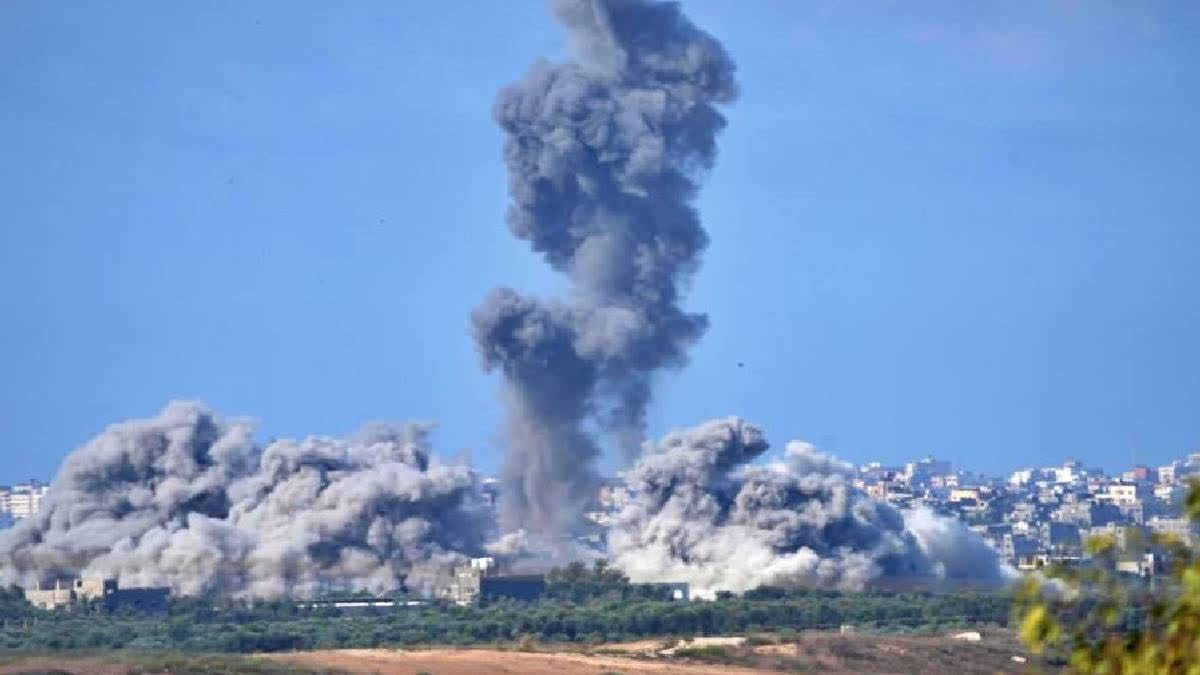Hyderabad: The city of Gaza, spanning 360 square kilometers and home to 2.3 million residents, is bearing the brunt of a relentless onslaught. To halt the unending violence in West Asia, what's needed is establishment of an independent, sovereign Palestine within the boundaries recognised through peace negotiations.
Weapons of mass destruction serve only to exacerbate humanitarian crises and cannot foster harmony. The very notion of peace withers on soil soaked in the blood of the innocent. The current surge of conflict in the West Asian region stands as a stark testament to this grim reality.
In retaliation to a brutal assault by Hamas militants, Israel is engaged in the relentless decimation of Gaza, which is reeling under the attack. Israeli forces are inflicting untold suffering upon the countless defenseless children and women, nonetheless asserting that their intent is not to wage war against the people of Gaza.
In an alarming turn of events, eleven million Palestinians in northern Gaza were compelled to flee their homes within a harrowing 24-hour timeframe to escape impending peril. The plight of ordinary civilians has grown ever more precarious in the shadow of this devastating conflict.
The question that looms large is who lit the fuse of the cataclysmic events that unfolded eight days ago, culminating in the unremitting violence we are witnessing today. Benjamin Netanyahu, who ascended to the position of Prime Minister in Israel in December 2022, harnessed the support of far-right extremist factions to secure his electoral victory, thereby giving rise to the most sectarian government in the country's history. His cabinet appointments included several racist individuals harboring virulent antipathy toward the Palestinian existence. Bolstered by their support, Israeli settlers have unleashed a torrent of unchecked aggression upon the West Bank and East Jerusalem.
The month of June alone witnessed approximately 310 attacks, including arson, perpetrated against Palestinians, while the first half of this year bore witness to the tragic loss of over 200 Palestinian lives in the West Bank. Even Benny Gantz, Israel's opposition leader, has not refrained from condemning these acts of violence, characterising them as dangerous manifestations of terrorism, borne out of a misguided strain of Jewish nationalism.
For quite some time, voices of concern had resounded, forewarning that the Israeli government, under the leadership of Netanyahu, was sowing the seeds of potentially catastrophic repercussions with its mistreatment of the Palestinian population. Regrettably, these ominous predictions have now come true, as the lives of ordinary citizens are cruelly snuffed out amidst the relentless maw of conflict.
The origin of Hamas, the organisation responsible for committing atrocities in Israel and the kidnapping of many Israelis, can be traced to a complex web of historical, political, and regional factors. The root causes of this conflict are deeply embedded in a tumultuous history. Israel's annexation of the West Bank, East Jerusalem, and the Gaza Strip occurred more than five and a half decades ago, setting the stage for a protracted struggle in the region.
In response to these territorial acquisitions, Yasser Arafat's Palestine Liberation Organization (PLO) initiated a campaign of guerrilla warfare. The PLO's platform of secular nationalism initially found favour among Palestinians seeking self-determination. However, as time passed, this vision became anathema to more conservative segments of the Palestinian population, who were subsequently mobilised by Israel against Arafat's leadership.
Hamas emerged as a direct result of Israel's strategy to sow division within the Palestinian community. Hamas espoused a belief in violent resistance at a time when Arafat's PLO was actively engaged in disarmament efforts and diplomatic endeavors to raise the Palestinian cause on the international stage. Gradually, Hamas garnered local support and evolved into a significant thorn in Israel's side. It found solidarity with Hezbollah and other Islamic Jihad organizations, while Iran, a traditional adversary of Israel, also targeted the country.
The dynamics in the Middle East have shifted over time, with several Arab countries seeking improved relations with Tel Aviv. Simultaneously, Israel, with the support of the United States, has largely disregarded the Palestinian issue, acting with increasing recklessness in the occupied territories. It has refused to comply with UN resolutions calling for the withdrawal from the territory acquired during the 1967 war and respecting the 'Green Line' in Jerusalem. Such hegemonic hubris jeopardizes Israel's own security.
Also Read: Netanyahu meets families of missing, captive Israelis after Hamas' assault
In the midst of the world's ongoing crises, including Russia's incursion into Ukraine, the escalating conflict in Israel further plunges us into a perilous vortex. To halt the unending violence in West Asia, as underscored by India and the international community, the establishment of an independent, sovereign Palestine within the boundaries recognised through peace negotiations is imperative. The question remains whether Israel will heed this call and, in doing so, extinguish the fires of war that threaten to engulf not only the region but also the world at large.
Also Read: UN chief Guterres calls on Hamas to 'immediately' release hostages without conditions



